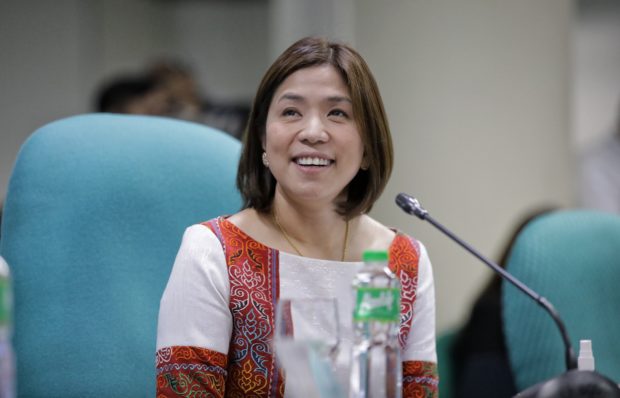
Budget Secretary Amenah Pangandaman (File photo from the Senate Public Relations and Information Bureau)
MANILA, Philippines — Leaders from different sectors gathered on Monday to discuss matters of development, sustainable growth, and maritime security in the Philippines during the first day of the “Pilipinas Conference” organized by the Stratbase Albert Del Rosario Institute.
“Now on its seventh year, the Pilipinas Conference 2022 aims to continue forwarding multi-sectoral collaboration and impacting policies on the most urgent social, political, and economic challenges that influence the Philippines and the Indo-Pacific region,” Stratbase said in a statement.
The conference had four panels that discussed a variety of topics, primarily on matters of governance reform, the role of the private sector in sustainable economic development, multilateral cooperation for international order, and the alliance between the Philippines and the United States.
Governance reform
Budget Secretary Amenah Pangandaman opened the panel discussion by highlighting public participation in political processes that are becoming more and more digitized.
“To achieve equitable participation in the digital society and bridge the widening digital divide, the government must make meaningful digital opportunities available for all — beyond basic connectivity,” Pangandaman said.
Ateneo School of Governance Dean Randy Tuaño discussed spaces where citizens can engage and participate in governance, emphasizing that it is important for the government to provide opportunities to citizens such as budget development and accountability.
Role of private sector
The second panel tackled the role of the private sector in promoting sustainable and resilient economic growth.
“The private sector has emerged as a critical actor in bridging the cost of both energy transition and the just transition of labor towards net zero,” Environment Secretary Maria Antonia Yulo-Loyzaga said.
She also highlighted the danger of climate change to the country’s resilience.
Raymond Ravelo, Meralco’s first vice president and chief sustainability officer, said that his company was already striving to be more sustainable in the long run by becoming coal-free by 2041 to 2050.
Multilateral cooperation
The third panel discussed multilateral cooperation to maintain order.
Here, matters of maritime security were discussed by the likes of acting Australian Ambassador Richard Sisson, Foreign Affairs Undersecretary Jesus Gary Domingo, and Coast Guard Capt. Havelino Salih.
“We have committed to upholding international law, and in particular, the law at sea, and this is why we invest in maritime partnerships in the region, to build maritime domain awareness, and to combat challenges like illegal, unreported, and unregulated fishing. And that’s why we continue to exercise freedom of navigation and overflight, and to support the rights of others to do the same, and strengthen relationships with regional partners,” Sisson said.
Transportation Secretary Jaime Bautista also spoke at the conference. According to him, the “government pursues various initiatives to promote and enhance maritime safety, while fostering relations with maritime counterparts and stakeholders.”
PH-US alliance
The last panel tackled the relationship between the US and the Philippines and its implications for peace and order.
US Ambassador to the Philippines MaryKay Carlson said that her country had been investing in the Philippines and its capacity to defend itself against threats.
Carlson also called upon China to uphold the 2016 South China Sea Arbitral Ruling, which decided in favor of the Philippines,
According to Carlson, $70 million will go into investing in the infrastructure of the Armed Forces of the Philippines.